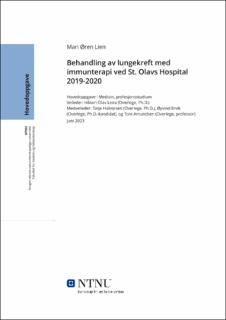| dc.description.abstract | Vi undersøkte bruken av immunterapi for behandling av lungekreft ved lungeavdeling St. Olavs hospital i perioden 2019-2020. Vi fant 85 pasienter, 45 menn og 40 kvinner. Median alder ved debut var 69 år. 61 personer hadde adenokarsinom , 17 plateepitelkarsinom, og resten annet. Av alle pasientene var 20 PDL1-negative, 52 hadde PDL1 uttrykk 1-49% % og 13 hadde PDL1 uttrykk 50-100 %. Pasientene som ble undersøkt hadde betydelig metastaseutbredelse ved debut av lungekreftsykdommen. 18 av pasientene hadde residiv av tidligere lungekreftsykdom. Pasientgruppen hadde en stor komorbid belastning, 88.2 % av pasientene hadde en komorbiditet av betydning Det var dermed en utfordring for klinikere å skille immunterapi bivirkninger fra deres grunnsykdom. Fram til oppfølgingen ble avsluttet 12. november 2022 levde 20 pasienter fortsatt.
Median behandlingstid var på 17,5 måneder og pasientene mottok fra 1 til 59 kurer immunterapi. Studien viste at 52 av 85 (61%) fikk immunterapibivirkninger. 78 % av disse (40/85) måtte avslutte behandling på grunn av dette. Fire pasienter døde av bivirkningen, en med multiorgansvikt. Den vanligste bivirkningen en så var tyreoiditt, videre hudutslett, pneumonitt, artritt, kolitt og hepatitt. Etter oppstart av immunterapi pasientene i snitt hadde pasienten en median på 2 innleggelser.
Studien viste at kvinner lever lenger enn menn; median overlevelse på 21,7 måneder mot 13,7 hos menn. Pasienter med adenokarsinom som median 21 måneder, med plateepitelkarsinom 13 måneder, og pasienter med annen histologi 18 mnd. Som ventet var det sammenheng mellom metastaseutbredelse på debuttidspunkt og overlevelse; pasienter uten metastaser (typisk pasienter med residiv fra tidligere kreft) levde 19 måneder mot 2,4 mnd ved metastase i tre «organsystem.
Å oppleve en immunterapibivirkning hadde markant sammenheng med overlevelse: Pasienter som opplevde dette levde som median 22 mnd, mot 10 mnd hos pasientene uten registrerte bivirkninger. Det var ingen signifikant forskjell i overlevelse for ulike PS-WHO, alder over og under 70 år, ulike PDL1-utrykk og antall innleggelser.
Vi har sett at våre pasienter skiller seg betydelig fra deltagerne i studiene som ligger til grunn for godkjenningen av behandlingen i Norge. Likevel, til tross for at våre pasienter er eldre, har høyere WHO PS og flere komorbiditeter, har vi observert at en betydelig andel av våre pasienter oppnådde betydelig økt overlevelse og akseptable bivirkninger. At paseintene som opplevde immunbivirkninger så ut til å leve markant lengre, er spesielt interessant, da disse pasientene gjerne var utelukket fra de initiale medikamentstudiene.
Studien har gitt verdifull innsikt i bruken av immunterapi, bivirkningene og nytten av behandlingen og legger grunnlaget for videre studier og et fremtidig kvalitetsregister basert på vårt pasientmateriale. Vi har identifisert begrensninger i vårt valg av variabler og sett at klinikerne er mer vage i beskrivelsen av pasientenes tilstand, symptomer og funn enn forventet, noe som understreker behovet for tydeligere registreringer i pasientjournalene | |
| dc.description.abstract | We investigated the use of immunotherapy for the treatment of lung cancer at the Lung Department of St. Olav's Hospital during the period 2019-2020. We found 85 patients, 45 men and 40 women. The median age at onset was 69 years. Sixty-one individuals had adenocarcinoma, 17 had squamous cell carcinoma, and the rest had other types. Among all patients, 20 were PD-L1 negative, 52 had PD-L1 expression of 1-49%, and 13 had PD-L1 expression of 50-100%. The patients under investigation had a significant metastatic spread at the onset of lung cancer. Eighteen patients had a recurrence of previous lung cancer. The patient group had a high comorbidity burden, with 88.2% of patients having a significant comorbidity. This posed a challenge for clinicians to distinguish between immunotherapy side effects and their underlying diseases. As of the follow-up closure on November 12, 2022, 20 patients were still alive.
The median treatment duration was 17.5 months, and patients received 1 to 59 courses of immunotherapy. The study showed that 52 out of 85 (61%) experienced immunotherapy side effects. Among these, 78% (40/85) had to discontinue treatment as a result. Four patients died from the side effects, one due to multiorgan failure. The most common side effects observed were thyroiditis, followed by skin rash, pneumonitis, arthritis, colitis, and hepatitis. After starting immunotherapy, patients had an average of 2 hospital admissions.
The study showed that women had longer survival than men, with a median survival of 21.7 months compared to 13.7 months for men. Patients with adenocarcinoma had a median survival of 21 months, squamous cell carcinoma patients had 13 months, and patients with other histology had 18 months. As expected, there was a correlation between metastatic spread at the time of onset and survival; patients without metastases (typically patients with recurrence from previous cancer) lived for 19 months compared to 2.4 months with metastasis in three organ systems.
Experiencing an immunotherapy side effect was significantly associated with survival: patients who experienced this had a median survival of 22 months compared to 10 months for patients without recorded side effects. There was no significant difference in survival based on different PS-WHO scores, age above and below 70 years, PD-L1 expression levels, and the number of hospital admissions.
We have observed that our patients differ significantly from the participants in the studies underlying the approval of treatment in Norway. However, despite our patients being older, having higher WHO PS scores, and more comorbidities, we have observed that a significant proportion of our patients achieved significantly increased survival and acceptable side effects. The fact that patients who experienced immune-related side effects appeared to live significantly longer is especially interesting, as these patients were often excluded from the initial drug trials.
The study has provided valuable insights into the use of immunotherapy, its side effects, and the benefits of treatment, laying the foundation for further studies and a future quality register based on our patient material. We have identified limitations in our choice of variables and observed that clinicians are vaguer in describing patients' conditions, symptoms, and findings than expected, underscoring the need for clearer documentation in patient records. | |
